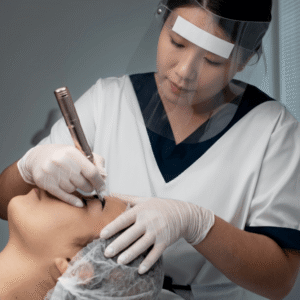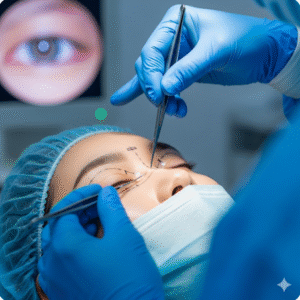Overview
Anorexia nervosa is a serious and potentially life-threatening eating disorder characterized by self-starvation, an intense fear of gaining weight, and a distorted body image. Individuals with anorexia go to extreme lengths to control their weight, often through excessive dieting, exercise, or purging behaviors. Despite being underweight, they may still perceive themselves as overweight. Early diagnosis and treatment are crucial for recovery.
What is Anorexia Nervosa?
Anorexia nervosa is a psychiatric disorder involving disordered eating behaviors and an intense preoccupation with body weight and shape. It typically begins during adolescence and is more common in females, though males can also be affected. People with anorexia severely restrict their food intake, often to the point of starvation, and may engage in purging, excessive exercise, or use of laxatives to lose weight.
There are two subtypes:
- Restricting Type – severe limitation of food intake
- Binge-Eating/Purging Type – periods of overeating followed by purging (vomiting or laxative use)
Symptoms
- Significant weight loss or failure to gain weight during growth periods
- Intense fear of gaining weight or becoming fat, even when underweight
- Distorted body image
- Obsession with calorie counting, food rituals, or portion control
- Denial of hunger and avoidance of meals
- Fatigue, dizziness, or fainting
- Brittle hair and nails, dry skin
- Amenorrhea (loss of menstruation in women)
- Cold intolerance due to low body fat
- Depression, anxiety, and social withdrawal
Causes
Anorexia nervosa is caused by a complex interaction of biological, psychological, and environmental factors:
- Genetic predisposition
- Personality traits such as perfectionism, obsessive tendencies, or low self-esteem
- Cultural and societal pressures to be thin
- Family or peer influence
- History of trauma or abuse
- Underlying mental health disorders (e.g., depression, OCD)
Risk Factors
- Female gender (especially adolescent girls and young women)
- Family history of eating disorders or mental illness
- Participation in activities emphasizing thinness (e.g., ballet, gymnastics, modeling)
- Peer pressure and bullying about weight
- Perfectionism or high achievement orientation
- Exposure to media that glorifies thin bodies
Complications
- Heart problems (e.g., bradycardia, arrhythmias)
- Electrolyte imbalances (can be fatal)
- Bone loss (osteoporosis)
- Muscle wasting and weakness
- Gastrointestinal problems
- Infertility
- Multi-organ failure
- Increased risk of suicide
- Permanent physical and cognitive damage if not treated early
Prevention
- Promote healthy body image from an early age
- Encourage balanced eating and exercise without fixation on weight
- Limit exposure to media that reinforces unrealistic beauty standards
- Open discussions about self-esteem, emotions, and mental health
- Early identification and intervention in children showing signs of disordered eating
- Family education and involvement in supporting mental wellness
Treatment Options in Korea
South Korea offers advanced multidisciplinary care for anorexia nervosa that includes psychiatric, nutritional, and medical support. Treatment is tailored to each individual’s physical and psychological needs.
1. Medical Stabilization
- In cases of severe malnutrition or electrolyte imbalance, hospitalization may be required
- Nutritional rehabilitation and monitoring of vital signs, heart function, and hydration
- Inpatient treatment is available at specialized mental health and university hospitals
2. Psychological Therapy
- Cognitive Behavioral Therapy (CBT) – to address distorted thoughts and develop healthier eating patterns
- Family-Based Therapy (FBT) – especially effective in adolescents, involving family in the recovery process
- Group therapy – for peer support and motivation
- Psychiatric medication – antidepressants or anti-anxiety medications may be used in some cases
3. Nutritional Counseling
- Registered dietitians help individuals establish healthy eating habits and meal plans
- Education on nutrition and body function
- Monitoring for safe weight restoration
4. Ongoing Support & Monitoring
- Long-term follow-up to prevent relapse
- Support groups for patients and families
- Regular outpatient psychiatric care for underlying mood or anxiety disorders













